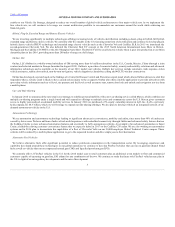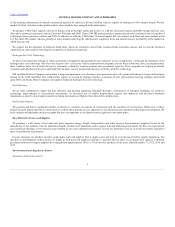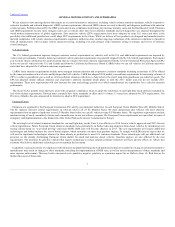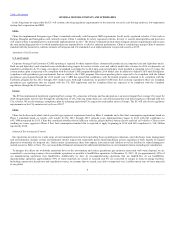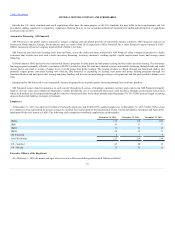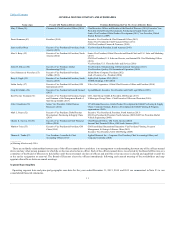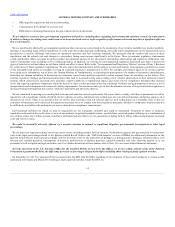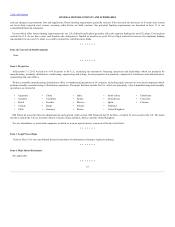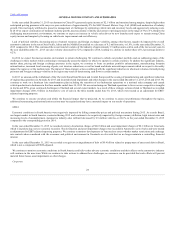General Motors 2015 Annual Report Download - page 18
Download and view the complete annual report
Please find page 18 of the 2015 General Motors annual report below. You can navigate through the pages in the report by either clicking on the pages listed below, or by using the keyword search tool below to find specific information within the annual report.
Table of Contents
consented to, among other things, the filing of a two-count information (the Information) in the U.S. District Court for the Southern District of New York
charging GM with a scheme to conceal material facts from a government regulator and wire fraud. We pled not guilty to the charges alleged in the
Information. The DPA further provides that, in the event the Office determines during the period of deferral of prosecution (or any extensions thereof) that we
have violated any provision of the DPA, including violating any U.S. federal law or our obligation to cooperate with and assist the independent monitor, the
Office may, in its discretion, either prosecute us on the charges alleged in the Information or impose an extension of the period of deferral of prosecution of
up to one additional year. Under such circumstance, the Office would be permitted to rely upon the admissions we made in the DPA and would benefit from
our waiver of certain procedural and evidentiary defenses. Such a criminal prosecution could subject us to penalties that could have material adverse effect
on our business, financial position, results of operations or cash flows.
Government safety standards require manufacturers to remedy certain product safety defects through recall campaigns. Under these standards, we could be
subject to civil or criminal penalties or may incur various costs, including significant costs for free repairs. At present, the costs we incur in connection with
these recalls typically include the cost of the part being replaced and labor to remove and replace the defective part. We currently source a variety of systems,
components, raw materials and parts, including but not limited to air bag inflators, from third parties. From time to time these items may have performance or
quality issues that could harm our reputation and cause us to incur significant costs. For example, based on defect information reports filed with NHTSA by
TK Holdings Inc. (Takata), we are currently conducting recalls for certain Takata air bag inflators used in some of our prior model year vehicles. We are
continuing to assess the situation. Further recalls, if any, that may be required to remediate Takata air bag inflators in our vehicles could have a material
impact on our financial position, results of operations or cash flows. In addition product recalls can harm our reputation and cause us to lose customers,
particularly if those recalls cause consumers to question the safety or reliability of our products. Conversely not issuing a recall or not issuing a recall on a
timely basis can harm our reputation, potentially expose us to significant monetary penalties, and cause us to lose customers for the same reasons as
expressed above.
Our automotive operations are dependent upon the continued ability of our suppliers to deliver the systems, components, raw materials and parts that we
need to manufacture our products. Our use of “just-in-time” manufacturing processes allows us to maintain minimal inventory quantities of systems,
components, raw materials and parts. As a result our ability to maintain production is dependent upon our suppliers delivering sufficient quantities of
systems, components, raw materials and parts on time to meet our production schedules. In some instances we purchase systems, components, raw materials
and parts from a single source and may be at an increased risk for supply disruptions. Financial difficulties or solvency problems with our suppliers, which
may be exacerbated by the cost of remediating quality issues with these items, could lead to uncertainty in our supply chain or cause supply disruptions for
us which could, in turn, disrupt our operations, including production of certain of our higher margin vehicles. Where we experience supply disruptions, we
may not be able to develop alternate sourcing quickly. Any disruption of our production schedule caused by an unexpected shortage of systems,
components, raw materials or parts even for a relatively short period of time could cause us to alter production schedules or suspend production entirely.
We assemble vehicles at various facilities around the world. These facilities are typically designed to produce particular models for particular geographic
markets. No single facility is designed to manufacture our full range of vehicles. In some cases certain facilities produce products that disproportionately
contribute a greater degree of profit to the Company than others. Should these or other facilities become unavailable either temporarily or permanently for
any number of reasons, including labor disruptions, the inability to manufacture vehicles there may result in harm to our reputation, increased costs, lower
revenues and the loss of customers. We may not be able to easily shift production of vehicles at an inoperable facility to other facilities or to make up for lost
production. Any new facility needed to replace an inoperable manufacturing facility would need to comply with the necessary regulatory requirements, need
to satisfy our specialized manufacturing requirements and require specialized equipment. Even though we carry business interruption insurance policies, we
may suffer losses as a result of business interruptions that exceed the coverage available or any losses which may be excluded under our insurance policies.
15


